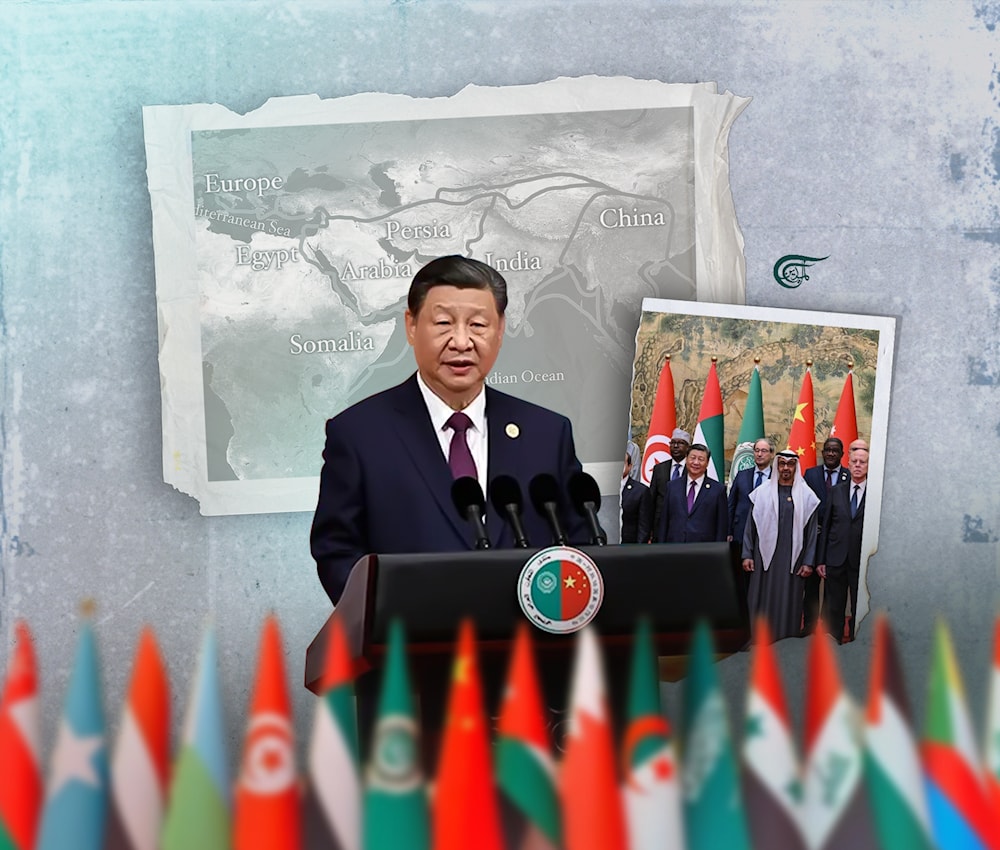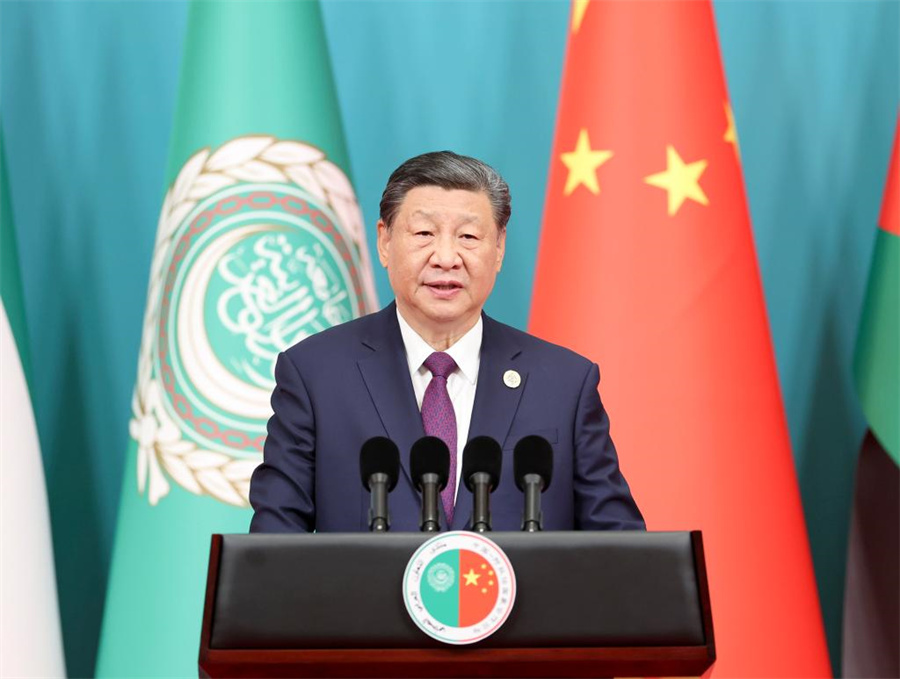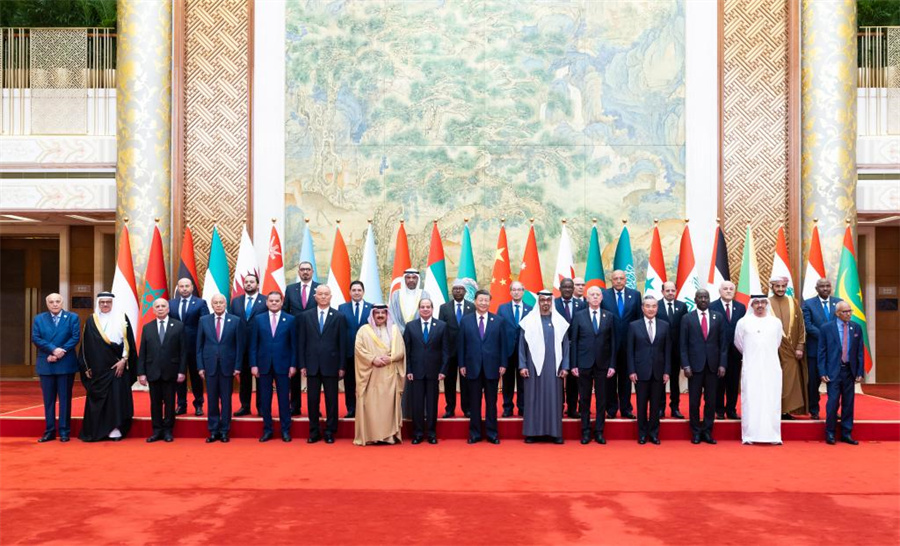Xinhua – May 31, 2024
Xi urges greater efforts to build China-Arab community with shared future
BEIJING -- Chinese President Xi Jinping on Thursday called on China and Arab states to deepen cooperation and step up the building of a China-Arab community with a shared future.
Xi made the remarks in a keynote speech at the opening ceremony of the 10th ministerial conference of the China-Arab States Cooperation Forum (CASCF).
CHINA-ARAB RELATIONS SCALING NEW HEIGHTS
China-Arab relations have kept scaling new heights since the beginning of the new century. At the first China-Arab States Summit in Riyadh, Saudi Arabia, in December 2022, China and Arab states agreed to build a China-Arab community with a shared future in the new era.
Xi said that China is satisfied with the progress that has been made in delivering on the first China-Arab States Summit's outcomes. China will work with the Arab side to enhance the role of the summit in providing strategic guidance for continued "leapfrog growth" of China-Arab relations.
Xi announced that China will host the second China-Arab States Summit in 2026, which is set to be another milestone in China-Arab relations.
As changes unseen in a century unfold rapidly across the world, both China and Arab states strive to accomplish their historical missions of national rejuvenation and faster national development. Building a China-Arab community with a shared future is a strong statement of the common desire for a new era of China-Arab relations and a better future for the world, Xi said.
Xi said China will work with the Arab side to make China-Arab relations a model for maintaining world peace and stability, a fine example of high-quality Belt and Road cooperation, a paradigm of harmonious coexistence between civilizations, and a model for promoting good global governance.
It is believed that the strategic mutual trust between China and Arab states will be further consolidated, cooperation in various fields will be comprehensively promoted, and the building of a China-Arab community with a shared future will see more solid steps, said Li Chen, ambassador for CASCF affairs of China's Foreign Ministry.
FIVE COOPERATION FRAMEWORKS
At the first China-Arab States Summit in 2022, Xi put forward "eight major cooperation initiatives" for practical cooperation.
Early harvests have been achieved in all the "eight major cooperation initiatives," Xi said, adding that China is ready to work with the Arab side on that basis to put in place "five cooperation frameworks" to step up the building of a China-Arab community with a shared future.
The five frameworks consist of a more dynamic framework for innovation, an expanded framework for investment and finance cooperation, a more multifaceted framework for energy cooperation, a more balanced framework for mutually beneficial economic and trade ties, and a broader framework for people-to-people exchanges.
China will build with the Arab side 10 joint laboratories in such areas as life and health, artificial intelligence (AI), green and low-carbon development, modern agriculture, and space and information technology. The two sides will also enhance cooperation on AI to make it empower the real economy and to promote a broad-based global governance system on AI, Xi said.
China is ready to establish with the Arab side an industry and investment cooperation forum, Xi said, adding that China supports closer cooperation between financial institutions from the two sides, and welcomes Arab banks to join the Cross-border Interbank Payment System.
China will further enhance strategic cooperation with the Arab side on oil and gas, and is ready to work with the Arab side on new energy technology R&D and equipment production, according to Xi.
China stands ready to accelerate the negotiations on bilateral and regional free trade agreements, welcomes active participation of the Arab side in the China International Import Expo, and is willing to expand import of non-energy products from the Arab side, especially agricultural products, Xi noted.
China is ready to establish with the Arab side the China-Arab Center of Global Civilization Initiative, Xi said, adding that China plans to work with the Arab side to achieve the goal of 10 million two-way visits of tourists in the next five years.
The development of Arab-China relations has broad prospects and great potential, and both sides have a sincere desire to further enhance relations and strengthen cooperation. It is believed that the work and achievements of the China-Arab States Cooperation Forum will have a pragmatic and positive role in promoting the development of both sides in various fields, Egyptian President Abdel Fattah El-Sisi said.
STICKING TO TWO-STATE SOLUTION
The Middle East is a land bestowed with broad prospects for development, but the war is still raging on it. Since last October, the Palestinian-Israeli conflict has escalated drastically, throwing the people into tremendous sufferings, Xi said.
He stressed that war should not continue indefinitely, justice should not be absent forever, and commitment to the two-State solution should not be wavered at will.
China firmly supports the establishment of an independent State of Palestine that enjoys full sovereignty based on the 1967 borders and with East Jerusalem as its capital. It supports Palestine's full membership in the U.N., and supports a more broad-based, authoritative and effective international peace conference, he added.
China will continue to provide assistance to help ease the humanitarian crisis in Gaza and support post-conflict reconstruction, and support the work of the U.N. Relief and Works Agency for Palestine Refugees in the Near East in providing emergency humanitarian assistance to Gaza, Xi said.
China has fully implemented the Global Security Initiative, actively promoted the political settlement of regional hotspot issues, and brokered a historic reconciliation between Saudi Arabia and Iran, a move that not only helped ease tensions within the region but also catalyzed a wave of reconciliations among Arab states and within the broader region, said Wu Sike, China's former special envoy to the Middle East.
Bahrain highly appreciates China's firm support for the just cause of the Arabs, especially on the Palestinian question, its tremendous efforts to alleviate the suffering of the people in Gaza and its full support for the establishment of an independent State of Palestine, Bahrain's King Hamad bin Isa Al Khalifa said.
The 10th ministerial conference of the CASCF adopted the Beijing Declaration, the CASCF execution plan for 2024-2026, and a China-Arab states joint statement on the Palestinian issue.
During the conference, China also signed a number of bilateral and multilateral cooperation documents with the participating countries and the General Secretariat of the Arab League.
http://en.cppcc.gov.cn/2024-05/31/c_992042.htm
Reading in President Xi Jinping speech at 10th China-Arab Ministerial Meeting
Bouthaina Shaaban
Xi is a statesman who reads the past and unravels its important messages only to save the present ship from turbulent storms and chart a promising future for humanity at large.
In the opening of the 10th China-Arab Ministerial Meeting, President Xi Jinping delivered a speech worthy of a long pause and a dwelling on its direct and indirect remarks and visionary observations, not only for the Arabs and Chinese people who are directly involved but for the world at large, especially for those who are struggling to explain what is happening in Gaza and Ukraine and why. 
In this speech, as in other speeches, Xi is a statesman who reads the past and unravels its important messages only to save the present ship from turbulent storms and chart a promising future for humanity at large. In this regard, he envisioned that the China-Arab existing friendship and the ties between Arab and Chinese people are rooted in the friendly exchange on the ancient Silk Road, the fight for national independence, and the mutually beneficial cooperation for state building and prosperity for all. From this perspective, President Xi moved to speak in detail about the best way to build a joint future for both, the Chinese and the Arabs, embodying their aspirations to start a new era of relations, which also helps to create a beautiful future for the entire humanity.
In this regard, and for the sake of achieving these noble and difficult goals at the same time, President Xi stresses that only mutual respect may achieve a harmonious existence and rid us of the stormy world in which we live, adding that fairness and justice are the only basis for lasting security and peace. Peace and security should be guaranteed for all countries and people, and real respect should be paid to the UN charter and the independent choices of people, and the reality that has been formulated through the ages should also be respected. The cornerstone for a better world should be equality, mutual respect, mutual benefits, and the harmonious coexistence of different civilizations on the basis of peace, credibility, and forgiveness.
Regarding the Middle East, President Xi said that it is a land bestowed with broad prospects for development, but the war is still raging on it. In this concise statement, the Chinese President has summed up the tragedy that has befallen the Arab nation since the discovery of oil and gas in their lands. He also summed up the true reason for the terrorist wars against many Arab countries and the genocide taking place in Palestine by the Zionists and their supporters for the last eight months.
The vision that the Chinese President puts forward for China-Arab relations and the world at large is the antithesis of every element of Western vision, not only to the Middle East but also to the world at large. Western countries who colonized the Middle East, Asia, and Africa only see in our countries free raw materials, free oil, and free gas for their industries and never see us as people. Quite the contrary, they promoted the myth of land with no people for people with no land, when they created their advanced representative in our region: the Zionist entity.
There is no room in their dictionary for mutual respect or mutual benefit or joint future, as they see themselves as the only masters and owners even of our land and of what is bestowed upon it. That is why they keep launching wars against us either to annihilate us or to slow us down to the extent that disables us from using our natural wealth to build our countries. Nation-building and prosperity in Western opinion are only allowed for them or their satellite states. The genocide against the Palestinian people has proven that they have no respect for international law or even for what their students or people believe in or hold in high esteem. This genocide has proven that Western democratic systems are not democratic at all and that money and armaments hold power keys in the West.
Perhaps that is why Western analysts failed to see the essence of Xi Jinping’s speech, as one of them said, “Beijing sees the ongoing conflict as a golden opportunity to criticize the West’s double standards on the international scene and call for an alternative global order." Another source said, “China has positioned itself in alignment with the Arab world and the broader global South." The Chinese President never neglects referring to the shared future of humanity while all that President Biden and Western leaders talk about and work for is the security of their "satellite state": "Israel", even as it is perpetrating the most horrendous genocide the world has ever witnessed.
What is assuring is that Western logic looks and feels so hollow and pale compared with the strong, rooted, credible, and visionary logic of President Xi Jinping, who is convincing even to Western people; the fact that started to trouble Western governments and their hypocritical media empire.
https://english.almayadeen.net/articles/opinion/reading-in-president-xi-jinping-speech-at-10th-china-arab-mi
Bridging continents:
China-Arab States Cooperation Forum's path to new cooperation
Adam O. Erol
As the world watches, a notable confluence of leaders from Bahrain, Egypt, Tunisia and the UAE are in China from May 28 to June 1. Their state visits culminated in the 10th ministerial conference of the China-Arab States Cooperation Forum (CASCF). This pivotal event promises to reshape international relations and economic partnerships between the Arab world and China, highlighting a new era of strategic cooperation.
This year's forum, set against the backdrop of a globally recuperating economy, was not merely a ceremonial gathering but a strategic alignment of mutual interests in areas such as trade, technology and security. The presence of King Hamad bin lsa Al-Khalifa, President Abdul Fatah Al Sisi, President Kais Saied, and President Mohamed Bin Zayed Al Nahyan underscored its significance. These leaders' participation emphasizes the Arab states' commitment to deepening ties with China. This emerging superpower has consistently expanded its influence in the Middle East through initiatives such as the Belt and Road Initiative (BRI) and beyond.
Strategic alliances and economic cooperation
The conference has adopted a series of outcome documents including the Beijing Declaration and the CASCF execution plan for 2024-2026. These groundbreaking agreements show China and Arab states' continuous support for one another on core interests and promise to enhance cooperation in various fields including "politics, economy and trade, investment, finance, infrastructure, resources and environment, cultural exchanges, aerospace, education and health." The outcomes have set a new benchmark for cooperation and they reflect a shared vision of development that prioritizes sustainable practices and technological advancement, aiming to create a ripple effect across economies and communities.
China's commitment to infrastructural development in the Arab world is particularly noteworthy. The BRI has already completed numerous projects, such as ports, railways, and industrial parks, enhancing connectivity and economic integration. The new agreements will likely extend these initiatives, focusing on smart infrastructure and sustainable urbanization. Investing in green energy is another critical collaboration area, with both sides recognizing the urgent need to transition to renewable energy sources to combat climate change and ensure long-term energy security.
Commitment to peace and security
A China-Arab states joint statement on the Palestinian issue was released after the conference. Amidst ongoing global conflicts and the volatile nature of Middle Eastern politics, China and the Arab states have pledged to work together to stabilize the region. This involves diplomatic efforts and practical measures against threats that undermine regional peace.
China's foreign policy emphasizes non-interference and peaceful resolution of conflicts, principles that resonate with many Arab states seeking stability amidst regional turmoil. The CASCF provides a platform for dialogue and collaboration on security issues, enabling member states to address common threats such as terrorism and extremism. This collaborative approach to security enhances regional stability and contributes to global peace.
Future implications and global impact
However, while the forum highlighted areas of cooperation, it also illuminated the challenges ahead. The complexities of aligning such diverse political agendas and economic priorities continually test the strength and durability of these partnerships.
The strengthening of Sino-Arab relations could potentially shift regional power dynamics, affecting the Middle East and global geopolitics. The emphasis on cooperation over conflict offers a hopeful vision for the future, but it also necessitates careful, continuous dialogue to address any divergences that may arise.
The potential economic impact of this partnership is substantial. Enhanced trade and investment flows between China and the Arab states will stimulate economic growth, create jobs, and improve living standards. The focus on sustainable development and green energy will contribute to global efforts to combat climate change, setting a positive example for other regions.
In conclusion, the 10th ministerial conference of the CASCF marks a significant stride toward a more interconnected and cooperative future between China and the Arab world. The agreements forged and the declaration made during this period do not merely represent diplomatic formalities. They are a testament to a shared commitment to a prosperous, stable and harmonious world.
As we move forward, it will be crucial to monitor the implementation of these agreements and the real-world impacts they will bring. The potential for a transformative partnership exists but will require persistent effort, mutual respect and a keen awareness of the global stakes involved. The path laid out by this forum is promising, and the eyes of the world will be watching to see how these newly forged paths between China and the Arab states unfold.
Adam O. Erol, a special commentator on current affairs for CGTN, is a distinguished columnist known for his deep expertise on China, the Middle East, and Türkiye's foreign policy. His diverse background includes journalism and politics, enriching his analysis and commentary.

|
Published since July 2008 |
Your donation
is tax deductable.
The Journal of America Team:
Editor in chief:
Abdus Sattar Ghazali
Senior Editor:
Prof. Arthur Scott
Special Correspondent
Maryam Turab




